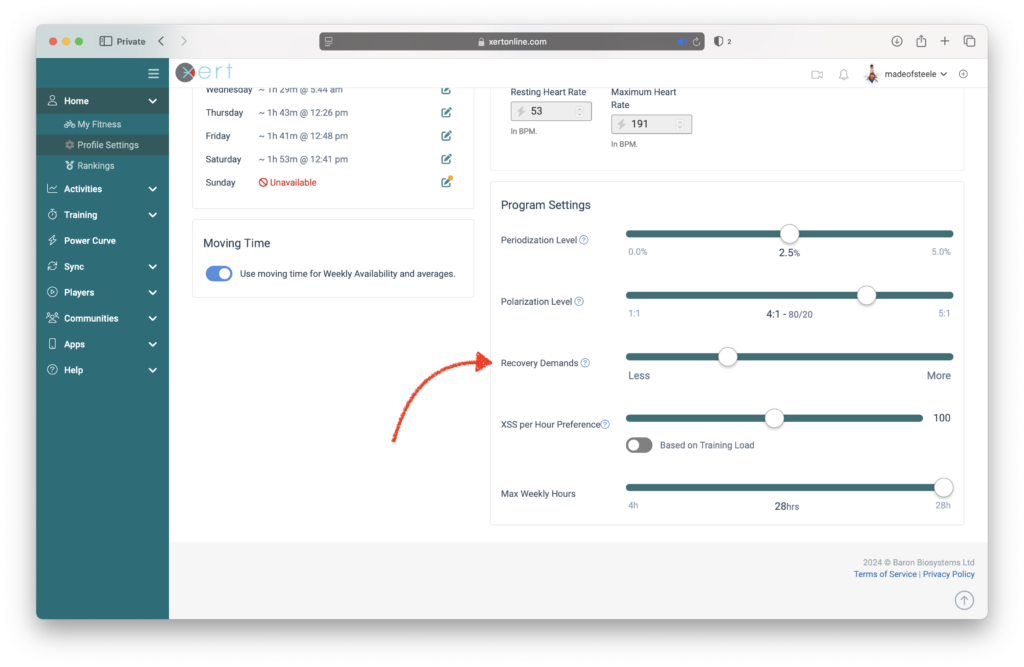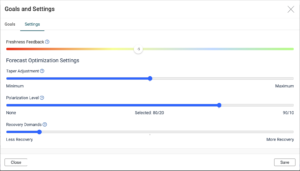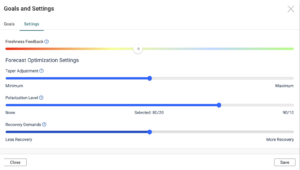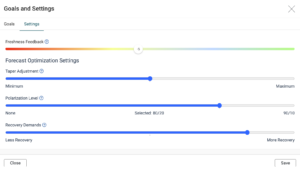
By default, Xert will calculate your recovery needs from your uploaded activities. These show up as Form on the Planner and the Adaptive Training Advisor uses this to prescribe the training. You’ll notice the effect of this with red and yellow gradient colours for example. This is where your setting for Recovery Needs is used – less recovery will mean shorter red and yellow sections and more recovery means longer red and yellow sections:
You will find the Recovery Demands Slider in the Profile Settings page under the General tab. Move the slider to the right if you wish to be a bit more conservative, or if you feel that you need additional recovery days. Move the slider to the left if you feel that you are able to recover more quickly or if you want to have less recovery/rest days. Recovering more quickly means you can train more and increase your fitness more quickly. You can choose a higher improvement rate. Recovering more slowly reduces your ability to ramp up your training and you may need to choose a lower improvement rate.
Note: caution should be used when reducing this setting – this could potentially lead to overtraining and/or burnout.
There can be differences in how people recover from cycling based on a variety of factors including individual fitness levels, genetics, age, nutrition, hydration, sleep, and overall health. Recovery is a complex process that involves physiological, biochemical, and psychological factors. By default, Xert considers several of these factors when calculating your recovery needs:
- Fitness Levels: Individuals with higher fitness levels might recover more quickly from low-intensity cycling compared to those who are less fit. Well-trained athletes often have more efficient cardiovascular systems, which can help with quicker recovery.
- Training Load: The intensity and duration of the cycling session can impact recovery. Even though low-intensity cycling is less taxing than high-intensity workouts, individuals who are new to exercise might still need more time to recover.
- Previous Conditioning: People who are regularly engaged in low-intensity cycling or other forms of exercise might adapt over time, leading to faster recovery as their bodies become accustomed to the activity.
However, there are some factors that Xert isn’t currently able to consider that might impact your recovery. Some of the factors listed below may impact whether you wish to personalize your recovery setting:
- Age: Age can play a role in recovery. Younger individuals tend to recover faster due to their generally higher metabolic rates and greater resilience of tissues. Older individuals might experience slightly slower recovery due to factors like reduced muscle mass and slower metabolism.
- Individual Response: Every individual’s body responds differently to exercise. Some people might experience muscle soreness or fatigue more intensely and take longer to recover.
- Genetics: Genetic factors can influence an individual’s response to exercise and recovery. Some people might naturally have better muscle recovery mechanisms than others.
- Illness: Whether you are a competitive athlete recovering from an acute illness or a fitness enthusiast suffering from a chronic disease, your ability to recover from additional stress due to exercise may be affected.
Lastly, there are some additional factors that might factor into your recovery from exercise in general. These factors are transient and could be accounted for using the Freshness Feedback Slider.
- Nutrition: Proper nutrition is crucial for recovery. Consuming an appropriate balance of carbohydrates, proteins, and fats post-exercise can support muscle repair and replenishment of energy stores. Adequate hydration is also important.
- Sleep: Sleep is a critical factor in recovery. During sleep, the body undergoes repair processes that are essential for muscle recovery and overall well-being. Individuals who get sufficient and quality sleep often recover faster.
- Hydration: Staying hydrated before, during, and after exercise is important for maintaining performance and supporting recovery. Dehydration can slow down recovery processes.
It’s important to note that recovery is not a one-size-fits-all concept. Factors like individual goals, overall health, and training programs also come into play. Listening to your body, providing it with the necessary resources (nutrition, sleep, hydration), and gradually increasing exercise intensity can all contribute to better recovery.





